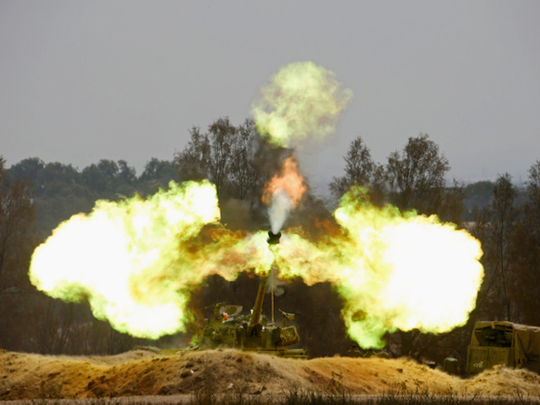
My older son was so excited when the Israeli bombing raids began. “Fireworks!” yelled Rami, four.
“No,” big sister Maryam, six, replied. “That is fire-bombing.”
“No, it’s fireworks, but a little bit different from what we used to see in Germany,” he replied as Hassan, two, took everything in, wide-eyed and terrified.
“OK, OK,” conceded Maryam, wisely. “You are right.” But I knew she was still far too young to understand fully.
My children used to talk about toys, The Lion King and books they were reading. Now they chat endlessly with each other about the war, bombings, shelling and the difference between F-16s and commercial jets. They want to know how many deaths or injuries occur after every strike.
This is the first war they have endured. They were born and raised in Germany, so they missed ‘Operation Cast Lead’ in 2008-09 and ‘Operation Pillar of Defence’ in 2012. We came back to Gaza one year ago because my mother was extremely ill (totally blind because of diabetes) and with the Rafah border consistently closed, it is impossible to get someone in her condition to Cairo, let alone to Germany.
Since our return, my children are constantly asking questions. “Why don’t children in Gaza have playgrounds? Why do children play in crowded streets? Why don’t their peers have enough food?” It breaks my heart to answer these questions, but at least I know how.
Since the war started, though, I’m stumped more and more often — and the questions are multiplying. “What is happening, Mum? Why are they killing children?” (Three of their young second cousins — Ebrahim, Eman and Asem — died, along with a pregnant woman and four other children, when Israel fired missiles at their multi-family apartment building. No military target was identified.) “Will we die, too? Why do they hate us? Don’t they have children?”
Am I supposed to tell them that, yes, we could die at any time from an incoming shell? Surely, I shouldn’t tell them about 19 children of the Abu Jamei family who were killed when a missile fired at one person struck them all as they ended their Ramadan fast one evening recently. How can I explain that, yes, the soldiers who have killed so many children often have children of their own? How can I convince them that fireworks in Germany signify joy and celebration, while “fireworks” in Gaza cause death?
The most painful question they have asked me is a response to our neurotic night-time habits. One night, I make all three sleep in the same bedroom with us, hoping to increase the odds that they will survive if a shell hits one of the empty rooms in our house. But then the next night, I separate them, thinking that they will not all die in one attack. (Unless we are hit by a half-tonne bomb, rather than an artillery shell, in which case we will all be killed, anyway.)
These are the painful contortions I would wish on mother anywhere. Yet, mothers throughout Gaza make these decisions every night — and live with the consequences of one ill-fated move. But how am I supposed to answer when Maryam asks: “Why do we sleep at different places each night?”
My children, as with all children in Gaza, will need therapy following this carnage. Most, of course, will not receive it. They will enter adulthood remembering these days and the soldiers, F-16s and drones that were heedless of their night-time cries and terror. Their mothers and fathers — unable to guard their children from these horrors — will need psychological help. And grandparents may have it worse of all, since the midnight terror this time feels terribly like the nights nearly seven decades ago when they were expelled from their homes in what became Israel — never to return.
— Washington Post
Wejdan Abu Shammala, who was born and raised in Gaza’s Khan Younis refugee camp, has a Masters in human-resources management from Golden Gate University. She is married to a Palestinian German.









